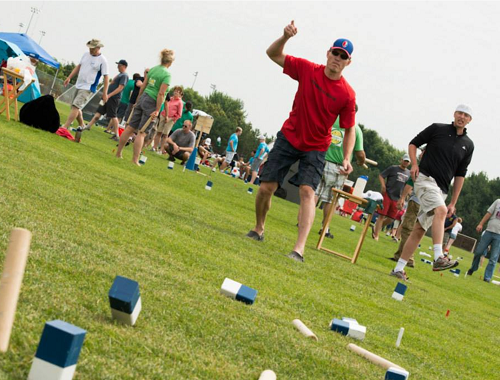
The U.S. National Kubb Championship held annually in Eau Claire, Wisconsin, is the largest kubb tournament outside of Europe. It is one of four, two-day tournaments in the world, and it is one of largest kubb tournaments in the world. The championship was first held in 2007 with 15 teams and 35 players. Each of the past four years, there were 128 teams with over 450 players. On Friday, the day before the Championship, Kid Kubb is held which is the only kubb tournament specifically for kids in the world and typically has 24 teams.
Through its outreach program, the organization takes part in numerous activities, events, and programs throughout the year to promote kubb in the Eau Claire area and around the country.
Kubb (rhymes with rube, not rub), is of Swedish origin, although it is sometimes known as “Viking chess.” It is a lawn game with the objective of knocking over wooden blocks by throwing wooden batons at them. Kubb can be described as a combination of bowling and horseshoes. Play takes place on a small rectangular playing field, known as a pitch.
There are multiple YouTube demonstrations of the game; one is here. Additionally, a video about the championship can be found here.
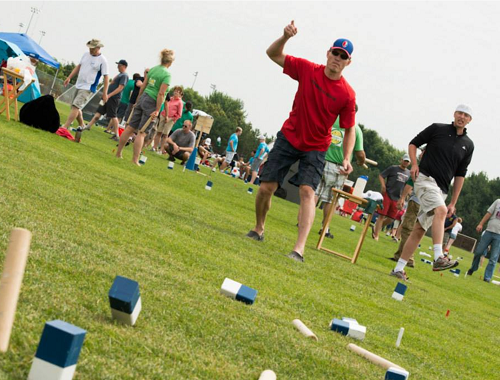
On December 13, 2011, through the City Council, Eau Claire officially became the Kubb Capital of North America. The U.S. Championship is one of many kubb tournaments, leagues, and events in the Eau Claire area.
Interestingly, the championship did not have a built-in player demographic; players had to be recruited and taught the game, and the event was built from the ground up.
Sports Destination Management: Kubb is a game that can be played in the backyard. Are you seeing an increased amount of interest in it with the pandemic?
Eric Anderson: It’s certainly safe to say interest hasn’t decreased. People are playing as much, if not more.
SDM: Do you think kubb will get more new players?
Anderson: That’s the hope. And website hits are up because people are doing searches on fun yard games they can play with their families. There are plenty of places to buy a kubb set – or you can find instructions on how to make one. We don’t know whether it will get us more competitive players; not everyone
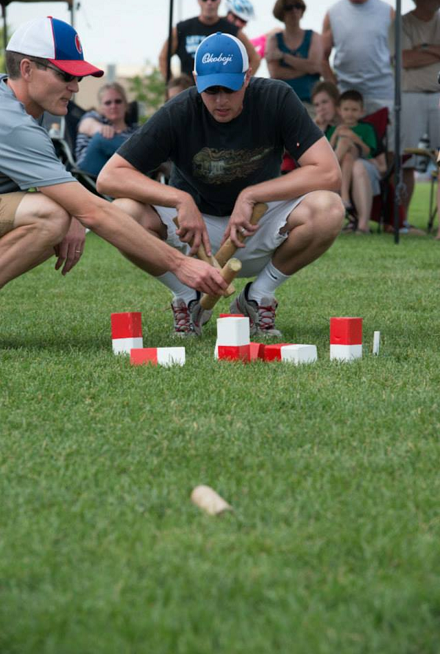
SDM: But it’s big in Eau Claire.
Anderson: Yes – here in Eau Claire, there are a ton of people who play it. There are leagues and clubs.
SDM: Unfortunately, this year’s championship had to be cancelled but what is attendance typically like?
Anderson: The past four years we’ve maxed out with 128 teams. Teams have to have at least three people, so events have had 480 to 500 players.
SDM: Is Wisconsin the only place it’s popular?
Anderson: No – there is play across the U.S., with tournaments in California, Pennsylvania, North Carolina, Minnesota, Michigan, Ohio and Arkansas, as well as leagues in those states and others.
SDM: But Eau Claire is the Kubb Capital of North America.
Anderson: Yes, we have the largest weekly kubb league in the world.
SDM: You were the founder of the championship. How hard was it to raise awareness of the sport?
Anderson: Prior to 2007 when we held our first event, I had yet to meet someone in Eau Claire who knew what it was, much less had played it before. I realized that early on, I might have had more luck trying to introduce boomerang because people would have heard of that.
SDM: Is it hard to learn?
Anderson: It’s not heard to learn but sometimes, you’ll try to explain it to people and they’ll say, “Oh, that’s too difficult to learn.” But it’s really not. It takes five minutes to learn and a lifetime to enjoy.
SDM: So it’s not a game of luck.
Anderson: No, kubb is a game of strategy. It’s more like chess. You have to be thinking ahead.
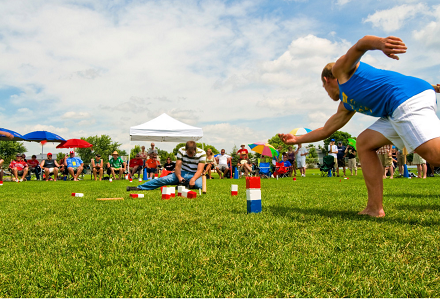
Anderson: We worked to get it into the elementary school’s P.E. classes, and we became involved with the city of Eau Claire’s block party program.
SDM: How does that work?
Anderson: Neighborhoods that want to host a block party put in an application with the city. The city will then come and put out barricades so that the area is safe. The city can send a fire truck and police officers for the kids to meet. They’ll also work with us and we’ll show up with a kubb set in a big rubber tub and we’ll give a free demonstration and teach people to play for an hour and a half. It really adds to the event.
SDM: Going back to the championships, how many of those teams come from your area?
Anderson: I would say about half of them.
SDM: Is it always in the same location or do you move around?
Anderson: We’ve had it in the same place since 2011. As it has grown over the years, we had to keep moving it. I drove around the city for a whole day one Sunday and found a soccer park that was big enough to host it, and we’ve been there since 2011.
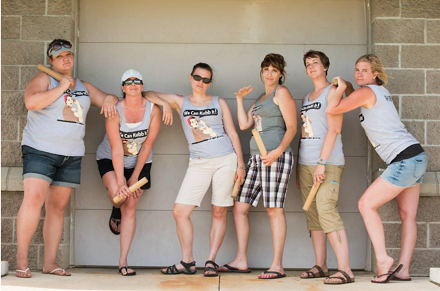
Anderson: Not really – at the U.S. championship, we’ve had kids on the podium who are ages 12 and 13, and we’ve had people all the way up to age 70. That makes it different from the sports where there is an average competitor who is a 30-year-old male.
SDM: What is the atmosphere like at the championship?
Anderson: We make it fun. There is music playing, there are 64 games going on at any given time, there are canopies up, people are walking around in their team shirts and holding signs for their teams. About a third of our teams are made up of families or groups of friends. While not everyone might compete at the same level, everyone is having a good time.

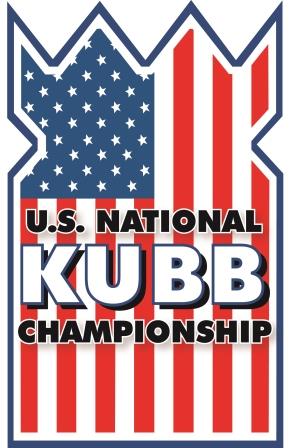 www.usakubb.org
www.usakubb.org